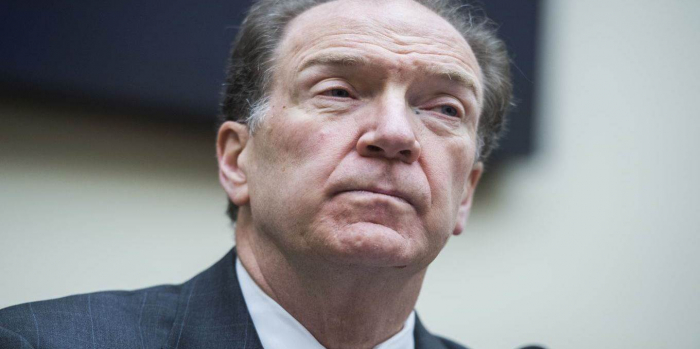Nominations opened this week for the World Bank presidency, one of the most powerful and important jobs in the international system. Many commentators have assumed that US President Donald Trump’s pick for the job will be a shoo-in. But history and current geopolitical conditions suggest this may not be the case.
To be sure, the United States has selected all 12 previous World Bank presidents, owing to an informal deal it struck with European governments after World War II, granting the Europeans the pick of the top job at the International Monetary Fund in exchange. Yet there are three reasons to think that this anachronistic carve-up of the international financial system’s top jobs could be about to end.
First, the leadership selection process at international organizations is becoming increasingly merit-based across the board. For example, everyone assumed that the Eastern European Group would get its “turn” to pick the next secretary-general of the United Nations in 2016. But after several rounds of public voting, the General Assembly elected former Portuguese Prime Minister António Guterres, the nominee of the Western European and Others Group.
The Trump administration has already suffered a similar loss of its own. Last year, its candidate to lead the International Organization for Migration, Ken Isaacs, was put out of the race in the second round of voting. For the first time since 1951, the agency elected a non-American, the much better qualified António Vitorino of Portugal.
Moreover, the World Bank presidency has itself become increasingly contested in recent years. When the most recent president, Jim Yong Kim, was interviewing for the job in 2012, he was widely regarded as less impressive than the two other candidates, both of them former finance ministers and heavyweights on the international scene. Only with the determined backing of the Obama administration did Kim manage to get over the line with the Bank’s Executive Directors.
Indeed, the second reason why this time may be different is that the Trump administration has nominated an especially unsuitable candidate: David Malpass. As the chief economist of Bear Stearns at the time of its collapse, Malpass did not see the 2008 financial crisis coming, and has since made his way into the US Department of the Treasury through political appointment. He has no significant experience working in developing countries, and he is openly skeptical of the benefits of multilateralism – the very raison d’être of the World Bank.
Third, an alliance of developing countries and European governments backing a merit-based selection process could be in the cards. The developing countries in the Intergovernmental Group of 24 will be putting forward good candidates to challenge the US, as they did last time. Several heavy hitters are already being touted, so the question is whether other developed countries – particularly European powers, which are over-represented on the board – will still back the US.
Surely, it is time for European governments to take the high road. They should announce that they will no longer insist on choosing the IMF managing director (which would be bowing to inevitability anyway) and back the best candidate for the World Bank presidency. They should bear in mind their experience in 2005, when they acquiesced to the US government’s desire to appoint the unsuitable Paul Wolfowitz as World Bank president, and then spent the next two years trying to get rid of him, eventually succeeding in 2007.
What would a good candidate look like? The Board’s selection criteria include some of the essential points. The nominee should have a proven track record of leadership and experience in managing large public organizations with international exposure. They should support multilateralism, offer a clear strategic vision for the Bank, and demonstrate strong diplomatic, communication, and management skills.
The obvious omission in the Board’s criteria is a deep understanding of development issues. Given that the World Bank operates only in developing countries, this missing category should and will loom large in the selection process this time around. Malpass, with his lack of experience in international development, will look wholly insufficient when compared to a heavyweight candidate backed by the G24.
The World Bank has reached a critical juncture. Now is the time for it to conduct a transparent, merit-based process to select its next president. Fortunately, the Board took some major steps forward last time around, not least by interviewing several candidates. Still, the process was not transparent. This time, the interviews should be conducted in public, or candidates should be required to defend their records in a variety of public forums. And, as with the UN secretary-general selection process, the Executive Directors’ final votes should be publicly recorded.
The next World Bank president will have a difficult job. Given mounting global challenges, the institution will have to be rebuilt and repositioned for a new age. Only a truly merit-based, transparent process will deliver that outcome.
Jesse Griffiths is Head of the Development Strategy and Finance team at the Overseas Development Institute.
Read the original article on project-syndicate.org.
More about: WorldBank
















































